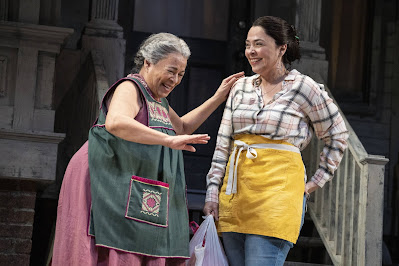By James V. Ruocco
In "Mojada: A Medea in Los Angeles," an edgy, harrowing, riveting character drama, now being showcased at Yale Repertory Theatre, Alfaro reworks the classic Greek tragedy of Euripides' "Medea" - a troubled woman who, in an act of vengeance against her husband Jason, murders his new wife as well her own two sons - into a modern-day telling of consequence, significance, complication and redemption.
Using the Mexican American barrio of Los Angeles as the background of his thrilling tale of migration, escape and rebirth, he tells the important story of one family's desire to find a new life in America while struggling for acceptance, financial gain, job satisfaction and power within the confines of their oppressive, marginalized, constrained environment.
As playwright, Alfaro crafts a fascinating piece of theatre - raw, real, remarkable - using words, dialogue, characters, situations and back story that erupt and sizzle with waves of excitement, surprise and exhilaration.
To keep his audience on edge, "Mojada" rumbles, tilts, roars, humors, breaks and teases. It keeps theatergoers nervously lit not only wondering how things will play out, but what wheels Alfaro will turn throughout - updates, flashbacks, monologues, ancient spirituality - as this drama spins and continually recharges its batteries while inching toward its descent into madness, darkness, violence and self-satisfied determination.
Mixing the elements of Greek tragedy with contemporary storytelling, Alfaro wisely retains the backbone of the original Euripides' story, but lets his version speak volumes through modern day observation, reaction and commentary.
Not to be undone, Yale Repertory Theatre, rises to the occasion, thus, producing a powerful drama that fully envelops its audience, spatters blood, mystifies, shocks and lets its heart bleed openly, figuratively and formidably.
Staging "Mojada: A Medea in Los Angeles," director Laurie Woolery ("El Huracan," "As You Like It," "The Tempest," "Promenade") dispenses Alfaro's work with a triggered balance and impassion that captures the complexity, the shatter, the force and the agonizing countdown of the actual story. Directorially, she brings great strength and detail to the piece, greatly establishing its significance, its aura, its invocations, its sounds, its bluntness, its sexuality and its voice.
As with the original work, first performed in 431 B.C., she shows that the impact of that play, reworked for "Mojada," has not lessened over time. Nor has it lost any of its relevance, its blaze, its cry for help or its Euripidean authority. Here, the parallels, the experiences, the waves and the dystopian nightmares framed accordingly and dramatically by Woolery mirror the same evolution of "Medea" beat by beat, bathed in narrative swatches of angst, wonder, purpose, revenge and entrapment.
"Mojada: A Medea in Los Angeles" stars Camillo Moreno as Medea, Alma Martinez as Tita, Alejandro Hernandez as Hason, Nancy Rodriguez as Josefina and Monica Sanchez as Armida.
Moreno delivers a commanding, articulate performance that embodies the chilling maze of emotions indicative of the playwright's modern-day take on the Medea character and her story. Martinez, as housekeeper and Greek chorus, is fluent in the play's machinations, movement, language, conflict and wide range of emotions. Hernandez sharply modulates the key changes in his character with natural charm, ease and determination. Rodriques brings gossipy alure and comedy to her portrayal of the neighborhood vendor. Sanchez plays the "other woman" in Hason's life with sly, forceful, seductive abandon.




No comments:
Post a Comment